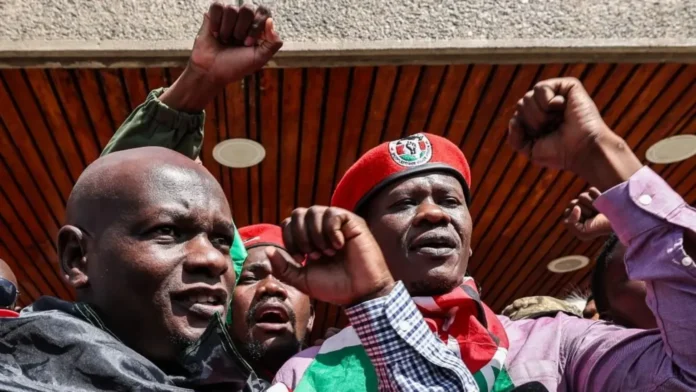
In a startling admission, Ugandan President Yoweri Museveni has confirmed that two Kenyan activists, Bob Njagi and Nicholas Oyoo, were arrested and held incommunicado for over five weeks—an ordeal he euphemistically described as being put “in the fridge.” The revelation has reignited concerns about the growing trend of cross-border repression in East Africa, where governments appear to be cooperating to silence dissenting voices.
The Disappearance
Njagi and Oyoo vanished in Uganda last month after attending a political event in support of opposition leader Bobi Wine. Eyewitnesses reported seeing them forced into a vehicle by masked men in uniform. For weeks, Ugandan authorities denied any knowledge of their whereabouts, prompting a wave of activism and diplomatic pressure from Kenya.
Museveni’s Admission
In a live interview, Museveni referred to the activists as “experts in riots,” claiming they were detained due to their alleged involvement in destabilizing activities. He suggested their release came only after intervention from unnamed Kenyan leaders, signaling the delicate balance of regional diplomacy.
A Harrowing Return
Upon their return to Nairobi, the activists were greeted by supporters. Njagi recounted the trauma: “Thirty-eight days of abduction was not easy. We didn’t think that we were going to come out alive because we were being abducted by the military.” Their release followed what Kenya’s Foreign Minister Musalia Mudavadi called “sustained diplomatic engagement.”
A Pattern of Repression
This incident is not isolated. Njagi himself was previously abducted in Kenya under similar circumstances. Other activists, including Boniface Mwangi and Agather Atuhaire, were detained in Tanzania earlier this year and subjected to brutal treatment. Ugandan opposition figure Kizza Besigye also mysteriously disappeared in Nairobi last year, only to reappear in a Ugandan military court.
Regional Solidarity and Outcry
Organizations like Vocal Africa, Amnesty International, and the Law Society of Kenya have condemned these actions, calling for stronger protections for activists across the East African Community. Vocal Africa stated, “Let this moment signal an important shift towards upholding the human rights of East Africans anywhere in East African Community.”
Political Undercurrents
Bobi Wine, Museveni’s main challenger in the upcoming elections, accused the government of targeting Njagi and Oyoo for their association with him. “If they committed any offence, why were they not produced before court and formally charged?” he asked.
The Bigger Picture
Museveni’s grip on power—nearly four decades strong—is increasingly maintained through opaque security operations and regional alliances that appear to prioritize regime stability over civil liberties. The chilling phrase “in the fridge” now serves as a grim metaphor for the silencing of dissent in East Africa.
As activists continue to face threats across borders, the region stands at a crossroads: will it uphold the democratic ideals it claims to champion, or will it deepen its descent into coordinated authoritarianism?
